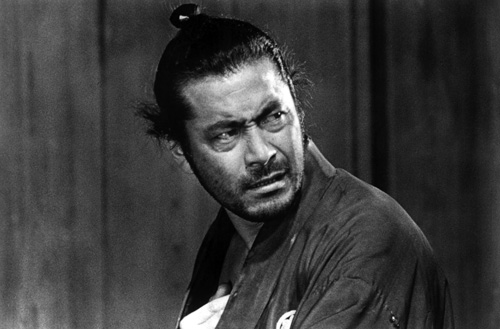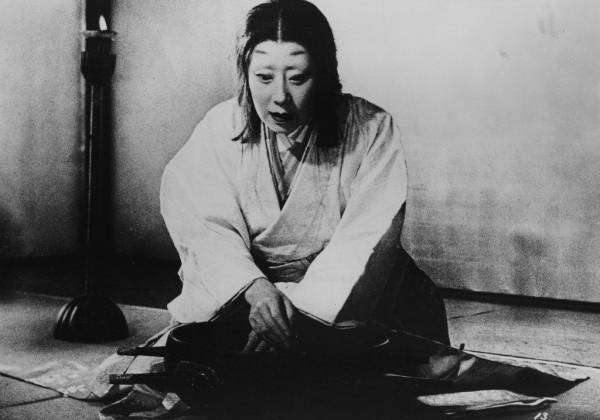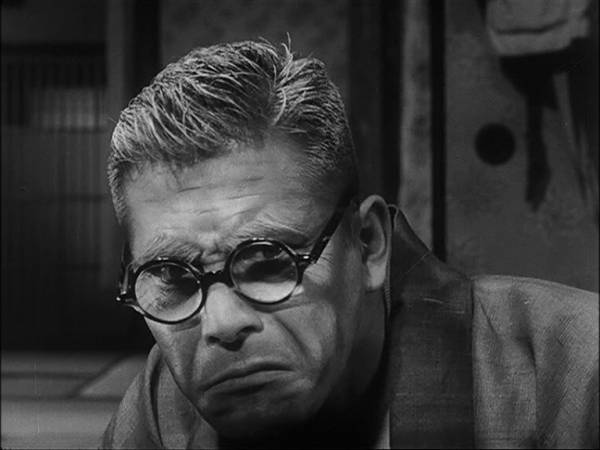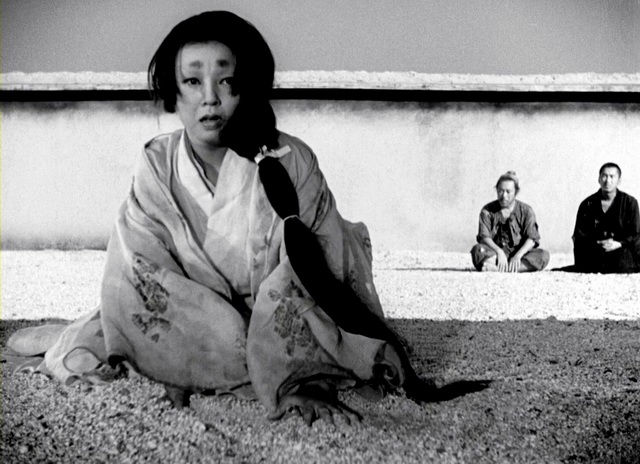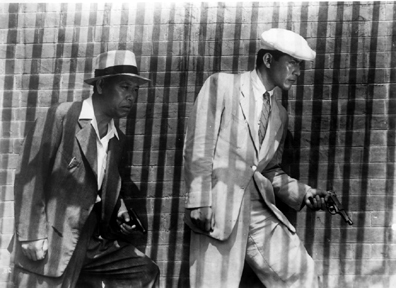
Takashi Shimura and Toshiro Mifune are on the hunt in Kurosawa detective story
STRAY DOG (Akira Kurosawa, 1949)
IFC Center
323 Sixth Ave. at West Third St.
June 3-5, $13, 11:00 am
Series continues through September 11
212-924-7771
www.ifccenter.com
 Akira Kurosawa’s thrilling police procedural, Stray Dog, is one of the all-time-great film noirs. When newbie detective Murakami (Toshirō Mifune) gets his Colt lifted on a bus, he thinks he will be fired if he does not get it back. But as he searches for it, he discovers that it is being used in a series of robberies and murders that he feels responsible for. Teamed with seasoned veteran Sato (Takashi Shimura), Murakami risks his career — and his life — as he tries desperately to track down his gun before it is used again. Kurosawa makes audiences sweat as postwar Japan is in the midst of a heat wave, with Murakami, Sato, prostitute Harumi Namiki (Keiko Awaji), and others constantly mopping their brows, dripping wet. Inspired by the novels of Georges Simenon, Stray Dog is a dark, intense drama shot in creepy black and white by Asakazu Nakai and featuring a jazzy soundtrack by Fumio Hayasaka that unfortunately grows melodramatic in a few key moments — and oh, if only that final scene had been left on the cutting-room floor. Stray Dog will be screening at 11:00 am on June 3-5 as part of the IFC Center’s Weekend Classics — Kurosawa series, with half of the proceeds from all festival screenings benefiting Japan Society’s Earthquake Relief Fund. Upcoming screenings includeKagemusha (June 10-12), High and Low (June 17-19), and Dodes’ka-Den (June 24-26).
Akira Kurosawa’s thrilling police procedural, Stray Dog, is one of the all-time-great film noirs. When newbie detective Murakami (Toshirō Mifune) gets his Colt lifted on a bus, he thinks he will be fired if he does not get it back. But as he searches for it, he discovers that it is being used in a series of robberies and murders that he feels responsible for. Teamed with seasoned veteran Sato (Takashi Shimura), Murakami risks his career — and his life — as he tries desperately to track down his gun before it is used again. Kurosawa makes audiences sweat as postwar Japan is in the midst of a heat wave, with Murakami, Sato, prostitute Harumi Namiki (Keiko Awaji), and others constantly mopping their brows, dripping wet. Inspired by the novels of Georges Simenon, Stray Dog is a dark, intense drama shot in creepy black and white by Asakazu Nakai and featuring a jazzy soundtrack by Fumio Hayasaka that unfortunately grows melodramatic in a few key moments — and oh, if only that final scene had been left on the cutting-room floor. Stray Dog will be screening at 11:00 am on June 3-5 as part of the IFC Center’s Weekend Classics — Kurosawa series, with half of the proceeds from all festival screenings benefiting Japan Society’s Earthquake Relief Fund. Upcoming screenings includeKagemusha (June 10-12), High and Low (June 17-19), and Dodes’ka-Den (June 24-26).
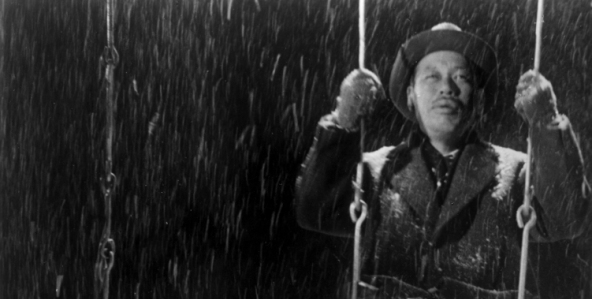
 In Akira Kurosawa’s 1952 gem, Ikiru, the great Takashi Shimura is outstanding as the simple-minded petty bureaucrat Kanji Watanabe, a paper-pushing section chief who has not taken a day off in thirty years. But when he suddenly finds out that he is dying of stomach cancer, he finally decides that there might be more to life than he thought after meeting up with an oddball novelist (Yunosuke Ito). While his son, Mitsuo (Nobuo Kaneko) and coworkers wonder just what is going on with him — he has chosen not to tell anyone about his illness — he begins cavorting with Kimura (Shinichi Himori), a young woman filled with a zest for life. Although the plot sounds somewhat predictable, Kurosawa’s intuitive direction, a smart script, and a marvelously slow-paced performance by Shimura make this one of the director’s best melodramas. Ikiru will be screening at 11:00 am on May 6-8 as part of the IFC Center’s Weekend Classics — Kurosawa series, with half of the proceeds from all festival screenings benefiting
In Akira Kurosawa’s 1952 gem, Ikiru, the great Takashi Shimura is outstanding as the simple-minded petty bureaucrat Kanji Watanabe, a paper-pushing section chief who has not taken a day off in thirty years. But when he suddenly finds out that he is dying of stomach cancer, he finally decides that there might be more to life than he thought after meeting up with an oddball novelist (Yunosuke Ito). While his son, Mitsuo (Nobuo Kaneko) and coworkers wonder just what is going on with him — he has chosen not to tell anyone about his illness — he begins cavorting with Kimura (Shinichi Himori), a young woman filled with a zest for life. Although the plot sounds somewhat predictable, Kurosawa’s intuitive direction, a smart script, and a marvelously slow-paced performance by Shimura make this one of the director’s best melodramas. Ikiru will be screening at 11:00 am on May 6-8 as part of the IFC Center’s Weekend Classics — Kurosawa series, with half of the proceeds from all festival screenings benefiting 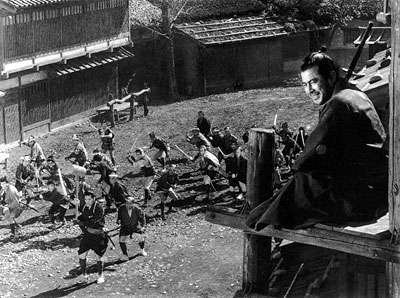
 Toshirō Mifune is a lone samurai on the road following the end of the Tokugawa dynasty in Akira Kurosawa’s unforgettable masterpiece. Mifune comes to a town with two warring factions and plays each one off the other as a hired hand. Neo’s battles with myriad Agent Smiths are nothing compared to Yojimbo’s magnificent swordfights against growing bands of warriors that include one man with a gun. Try watching this film and not think of several Clint Eastwood Westerns (particularly Sergio Leone’s A Fistful of Dollars, since this is a direct remake of that 1964 Italian flick) as well as High Noon. Yojimbo will be screening at 11:00 am on April 22, 23, and 24 as part of the IFC Center’s Weekend Classics — Kurosawa series, which continues next week with the Kurosawa-Mifune follow-up Sanjuro.
Toshirō Mifune is a lone samurai on the road following the end of the Tokugawa dynasty in Akira Kurosawa’s unforgettable masterpiece. Mifune comes to a town with two warring factions and plays each one off the other as a hired hand. Neo’s battles with myriad Agent Smiths are nothing compared to Yojimbo’s magnificent swordfights against growing bands of warriors that include one man with a gun. Try watching this film and not think of several Clint Eastwood Westerns (particularly Sergio Leone’s A Fistful of Dollars, since this is a direct remake of that 1964 Italian flick) as well as High Noon. Yojimbo will be screening at 11:00 am on April 22, 23, and 24 as part of the IFC Center’s Weekend Classics — Kurosawa series, which continues next week with the Kurosawa-Mifune follow-up Sanjuro.